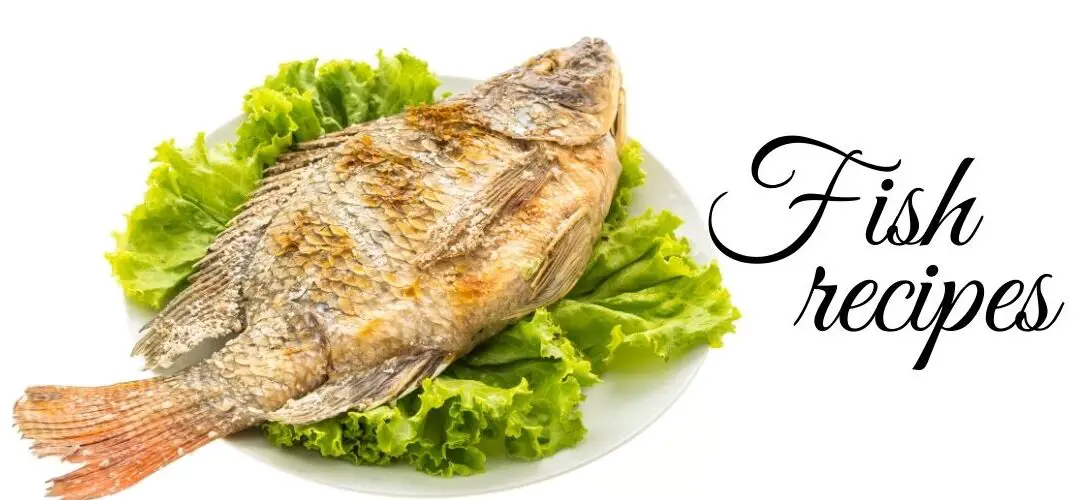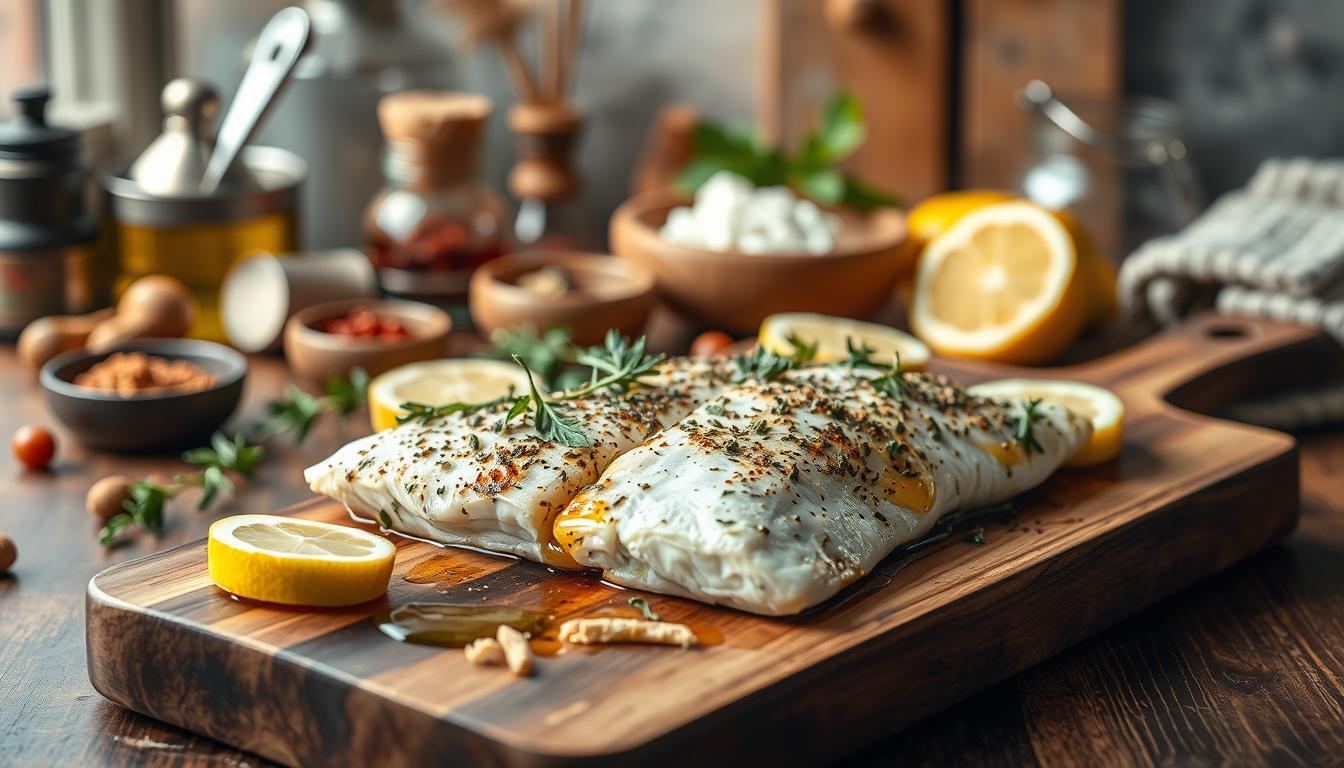How to Cook Pollock Fish for a Healthy Meal
Looking for the perfect weeknight dinner can be exciting. Pollock fish is my go-to for tasty, healthy meals that everyone loves. It’s great for both beginners and seasoned cooks, offering endless flavor options.
Pollock is a mild white fish that’s easy on the wallet. It’s perfect for those new to seafood or looking for something light. With pollock, you can make healthy, delicious meals that are quick and fun to make.
This guide will teach you everything about cooking pollock. You’ll learn about its health benefits and how to cook it like a pro. Get ready to make amazing dishes with pollock fish!
Table of Contents
Health Benefits and Nutritional Profile
Exploring pollock nutrition shows it has many health benefits:
- High-quality protein source
- Low in calories
- Rich in omega-3 fatty acids
- Contains essential vitamins B12 and D
Why Choose Pollock for Your Meals
Pollock is great for home cooking. Its mild taste works well with many recipes. You can bake, grill, or pan-sear it.
Comparing Pollock to Other White Fish
| Fish Type | Protein (g) | Calories | Omega-3 |
|---|---|---|---|
| Pollock | 19 | 110 | High |
| Cod | 17 | 120 | Moderate |
| Haddock | 16 | 130 | Low |
Pollock is caught sustainably and is certified by the Marine Stewardship Council. It’s a green choice that’s also delicious and nutritious.
Essential Ingredients and Kitchen Tools for Cooking Pollock
Getting ready to cook delicious pollock fillets means gathering the right stuff. Knowing what you need can make cooking easier and more fun. It helps you make tasty dishes without a hitch.
For cooking pollock fillets, you’ll need some key ingredients. Pollock seasoning can really boost the fish’s flavor. It makes your meal more exciting.
Key Ingredients for Pollock Seasoning
- High-quality olive oil
- Fresh lemon juice
- Kosher salt and black pepper
- Dried herbs like dill, parsley, or thyme
- Garlic powder
- All-purpose flour for coating
Essential Kitchen Tools
- Non-stick skillet or cast-iron pan
- Baking sheet
- Fish spatula
- Sharp kitchen knife
- Measuring spoons
- Mixing bowls
Your pollock seasoning mix can be simple or fancy. A basic mix of salt, pepper, and herbs is great for enhancing the fish’s taste.
“The right tools and seasonings can turn a simple pollock fillet into a restaurant-quality meal.”
Cooking pollock fillets needs careful attention. The right seasoning and tools ensure perfect results every time.
How to Cook Pollock Fish: Basic Preparation Methods
Cooking pollock fish is a fun experience when you know the right ways. This white fish is great for many dishes, making them go from basic to amazing.
To cook pollock well, you need to pay close attention and know how to handle it gently. Learning the basics of cooking pollock will make your seafood dishes better.
Proper Thawing Techniques
Thawing pollock right is key to keeping its taste and texture good. Here are some good ways to thaw it:
- Refrigerator thawing: Put frozen fillets in the fridge for 24 hours
- Cold water method: Put sealed package in cold water for 1-2 hours
- Avoid microwave thawing to prevent uneven cooking
Seasoning and Marinating Tips
Make your pollock taste better with these seasoning tips:
- Use light herbs like dill, parsley, and thyme
- Add citrus zest for a bright taste
- Make marinades with olive oil, lemon, and garlic
Temperature and Timing Guidelines
| Cooking Method | Temperature | Cooking Time |
|---|---|---|
| Pan-searing | Medium-high heat | 3-4 minutes per side |
| Baking | 400°F | 12-15 minutes |
| Grilling | Medium heat | 3-4 minutes per side |
Pro tip: Pollock is fully cooked when it flakes easily with a fork and reaches an internal temperature of 145°F.
Pan-Seared Mediterranean Pollock Recipe
Discover a pollock recipe that brings the Mediterranean to your dinner. This dish turns simple fish into a masterpiece. It’s both healthy and tasty.
Making fried pollock with Mediterranean flavors is simple. The secret is a golden, crispy outside and a soft inside.
Ingredients You’ll Need
- 4 pollock fillets (8 oz total)
- 1 tbsp olive oil
- 4 garlic cloves, minced
- 28 oz canned diced tomatoes
- 1/4 cup pitted olives, halved
- 2 tbsp capers (optional)
- 2 tbsp fresh herbs (parsley or basil)
- Salt and pepper to taste
Nutritional Breakdown
| Nutrient | Amount per Serving |
|---|---|
| Calories | 287 kcal |
| Protein | 49g |
| Total Fat | 5g |
| Carbohydrates | 11g |
Cooking Instructions
- Pat pollock fillets dry with paper towels
- Season fish with salt and pepper
- Heat olive oil in a large skillet over medium-high heat
- Sear fillets for 5 minutes on one side until golden
- Flip and cook for additional 2 minutes
- Remove fish and set aside
- In same pan, sauté garlic, add tomatoes, olives, and capers
- Return fish to pan, garnish with fresh herbs
Pro tip: The perfect Mediterranean pollock should have a crisp exterior and a moist, flaky interior. Cooking time is approximately 7 minutes total.
Baked Parmesan Pollock with Crispy Coating
Make your baked pollock meal prep special with this Parmesan-crusted recipe. It turns a simple fish dish into a gourmet treat. Pollock is a great protein that’s both nutritious and tasty.
Your crispy baked pollock will be a hit with your family. The secret is a perfect breading that keeps the fish moist and adds a crunchy texture.
Breading Mixture Preparation
To make the ultimate crispy coating, you’ll need these ingredients:
- ⅔ cup panko breadcrumbs
- ⅓ cup grated Parmesan cheese
- 1 clove minced garlic
- 1 teaspoon salt
- ½ teaspoon black pepper
- Optional: ½ teaspoon cayenne pepper
Baking Temperature and Time
For the best baked pollock, follow these steps:
- Preheat oven to 400°F
- Bake for 12-15 minutes
- Ensure internal temperature reaches 145°F
Texture and Doneness Tests
Check if your pollock is done by looking for these signs:
- Flaky texture when gently pressed
- Golden brown exterior
- Opaque white color throughout the fillet
Your baked Parmesan pollock is not just tasty but also full of nutrients. Each serving has 30g of protein, making it perfect for health-focused meal preppers.
Conclusion
Exploring healthy pollock recipes opens up a world of culinary possibilities. This whitefish is packed with nutrition and flavor. It can change your weekly meal planning.
Wild Alaskan pollock is a nutritional powerhouse. It’s full of omega-3 fatty acids and essential vitamins. The American Heart Association suggests eating fish like pollock at least twice a week for heart health.
Cooking pollock is easy, even for beginners. You can bake, grill, or pan-sear it. Each method brings a unique taste to your plate. Always use a meat thermometer to ensure the fish is cooked to 145°F for safety and flavor.
Your journey with pollock is just starting. Try different seasonings, cooking methods, and sides to find your favorite. With its great nutrition and versatility, pollock is a healthy and tasty addition to your meals.

